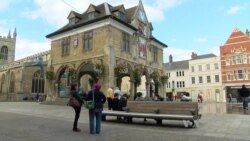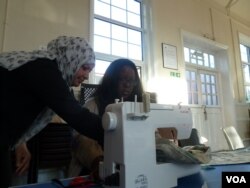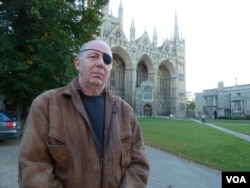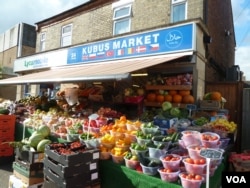A leaflet put out by Hungary’s leaders recently identified several British cities as “no-go zones” where immigrants, many of them Muslim, dominate. The leaflet cited the cities as examples of why Hungary should not accept migrants or refugees.
At least one of those British cities, Peterborough in England, has protested and has begun to receive Syrian refugees after a careful debate among city leaders.
Suhad el Marsomi, an asylum seeker from Iraq, defies the stereotypes of the newcomer who will not assimilate and who will take more than give.
“I’m a graduate from the college of economics in Iraq,” she said. “I have a business administration degree in my country. And I was working [at] the ministry of finance in Iraq.”
At an old union hall that now serves as a refugee center, she stands at a table with sewing machines, surrounded by refugees and British natives, taking turns among them, teaching them to make clothing and other items.
El Marsomi arrived in Britain last year with her elderly parents and has, like thousands of other refugees, an application pending for asylum. Several months into the process, she waits. Sitting at home was not an option for her.
“Until now I cannot work because I still wait the decision of the Home Office on my case. Until now, they are not agreeing to [grant] me [asylum]. I need to work,” she said.
Rich mix of culture
By some definitions, el Marsomi’s neighborhood, Peterborough’s Millfield area, is a ghetto, reflecting a rich diversity but also a reality that is unsettling to many.
English is often not heard on the streets, where Afghan fruit vendors peddle their wares and store signs advertise products in Dari, Pashto, Arabic, Polish and Hungarian.
Peterborough has a long tradition of welcoming immigrants, starting with Italians, who came by the hundreds in the 1950s to work in the city’s brick factories.
“The city has a heart, a real culture to it, which is one of acceptance,” said Adrian Chapman, a city council official. “The debate wasn’t whether or not we should accept Syrian refugees.”
Unlike other cities, where officials and citizens have raised concerns about terrorism and demographic changes, it was practical considerations and responsible management of the newcomers that were the key issues here.
“The debate in the first instance was really, do we have the finances to support any new arrivals? The issue around where these people were coming from did not feature,” Chapman said.
The city council’s consensus was to accept 25 families over five years.
Some quiet concerns
The decision was unanimous, but some residents quietly express concerns stemming from the struggle the city has faced in the past when it comes to assimilation.
“I’m not against foreign people, because I’m a foreigner myself,” said one Millfield resident who asked not to be identified other than as the son of Italian immigrants. “But some of these people come here and expect help, and the government forgets about people who are from here who also need help.”
“Not one English person comes on this street,” he said. “Not one person speaks English.”
A media official with the local UKIP party of anti-immigration advocate Nigel Farage, hung up on a reporter who asked for comment on the city’s decision to accept Syrian refugees.
But John Whitby, UKIP member of the city council, voted to accept the refugees and readily agreed to an interview. He said his constituents’ concerns focused on making a responsible, thoughtful decision.
“Cultural assimilation isn’t a problem when you’ve got small numbers,” Whitby said.
“We were for accepting them,” he said, “but once we knew what we were agreeing to we weren’t going to write an open check and say, ‘Yes, great, bring as many as you like.' We wanted to make sure that the numbers were manageable.”
Key for Whitby was an arrangement in which funding would not be siphoned from local programs in the city of nearly 200,000, which faces a severe housing shortage.
Charities step in
To mitigate the concern, the city turned to private, church-based charities, which found dwellings and received donations.
Sharon Keough of the Care Zone charity organization, showed a reporter around a warehouse stacked with furniture, clothing and food that have poured in.
“We will help anyone that has a need,” Keough said. “We will help anyone whether they have faith, no faith. No matter what background they come from. If they have a need, we will help.”
Ed Walker, head of Hope Into Action, another charity group, shares the same altruistic spirit, but also realism at a time when Britain has become more ethnically diverse.
“When I went to school, every one of my classmates was white, bar one or two, in the entire year or the entire school,” said Walker, who is 40. “My daughter now goes to a school with a whole range of colors, religions, languages and ethnicities. I see that as a wonderful thing for her to grow up in, but whether you think it is or isn’t, it’s our country now and you have to embrace it because it’s not going away.”
The alternative, he said, is not acceptable to him.
“We have to embrace this rich mix of people because the alternative is we ostracize them, and it does create hard lines between our communities and their communities and divisions and all this fear that comes from that,” Walker added.
One thing all sides agree on is that Peterborough is not a no-go zone. Ironically, among the most visible groups in the Millfield neighborhood are the Hungarians.
Integration isn’t a problem
At the refugee center run by a charity called the Promoting African Refugees Committee Association, where el Marsomi teaches sewing, integration is happening.
“If you can’t speak English, we are able to help you to speak English so you move into employment, from the job seeker allowance to the route to employment, we can help you,” said Moez Nathu, the association’s director. “We have a lot of refugees and asylum [seekers] from African continent and other parts of the country coming here, including Hungarians, in the city here.”
Joyce Youles, a Peterborough native, takes exception at any suggestion that Millfield is a no-go zone.
“They’re wrong, aren’t they? They shouldn’t say things like that,” Youles said.
“It is a good neighborhood to come. Especially coming here as well. It’s brilliant coming here. So much to learn. So many new people to meet, so many people to help in the world,” she added.
“We all get on great as a team, don’t we? We all work together as like a team. Everyone gets on all right,” Youles said.
One stitch at a time, el Marsomi has begun weaving herself into the fabric of Peterborough, starting as someone who receives help and becoming one who gives it.
She said she will continue to teach at the center while awaiting a decision on her asylum.
“Even if [it is for] free, it’s not a problem for me. Just I want to feel I’m human. I’m still human. I’m still in the life.”








